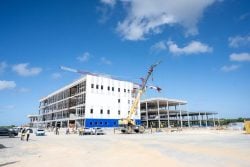MOGADISHU, (Reuters) – Insurgents in army uniforms stormed a hotel in Mogadishu frequented by Somali government officials yesterday, killing at least 31 people including members of parliament.
The hardline al Shabaab Islamists who have been fighting for three years to oust the fragile Western-backed “transitional government”, and control most of the city, claimed the attack.
Mohamud Huusein, a civil servant who lived in the hotel, told Reuters the gunmen had pretended to be government soldiers and approached the hotel’s entrance, bragging of having beaten some rebel militiamen.
“The security guards moved forward smiling, and eager to hear more stories but they were floored with fire and the gunmen entered the hotel and fired into every room and hall,” he said.
“I jumped out through a window, like many others who survived in this way. Finally when they run out of bullets and the hotel was under siege by government soldiers, the two men had only one option, to blow themselves up.”
The assault, several hundred metres away from the president’s residence, underscored the failure of the government and more than 6,300 mostly Ugandan African Union peacekeepers to bring order after nearly two decades of anarchy, making Somalia a continual source of instability for east Africa.
Last month al Shabaab expanded its reach as far as Uganda, claiming a double suicide bombing of packed bars in the capital Kampala, to put pressure on it to pull its troops out.
Those attacks killed more than 70 people and jolted the African Union into increasing the peacekeeping contingent and considering giving it a mandate to fight the rebels.
Yesterday, al Shabaab spokesman Sheikh Ali Mohamud Rage told reporters in Mogadishu that its fighters had “carried out an operation at Hotel Muna” and succeeded in killing government and intelligence officials, MPs and civil servants.
The Information Ministry said the 31 dead included six legislators and five government security personnel.
“The blood of the dead is leaking out of the hotel,” Information Minister Abdirahman Osman said.
In a testament to the violence, the head of one of the gunmen was still outside the two-storey hotel late in the afternoon and the body of another, missing one hand and riddled with bullets, lay nearby, a Reuters witness said.
Workers cleaned the hotel floor with brushes stained red as they pushed bloody water toward the building’s entrance.
The Muna Hotel stands in one of the small nominally government-controlled areas of the capital, between the presidential palace and the Indian Ocean.
Osman said one gunman had been captured. His ministry said two others blew themselves up, and that sporadic gunfire and shelling were continuing in the area.
“Some of the MPs had guns in their rooms and defended themselves before security forces arrived,” a government security source said.
On Monday, the African Union announced the arrival of hundreds of new peacekeepers, mostly Ugandans, for the AMISOM mission to help the government in its battle against al Shabaab.
The force has so far been able to do little more than guard the airport and port and shield President Sheikh Sharif Ahmed.
Somalia’s members of parliament, the apparent targets of Tuesday’s attack, do not benefit from this protection.
“We have the same enemies … and I don’t know why the MPs don’t have the same security,” said pro-government lawmaker Abdiladif Muse Sanyare.
He was speaking from Nairobi, where many of the MPs say they have to live to feel safe, even at the risk of alienating ordinary citizens.
The security source said more than 300 armed al Shabaab fighters were thought to live in the supposedly government-controlled neighbourhood.
“They disguise themselves as civilians running different smaller businesses and working in different restaurants and shops,” he said.
The insurgents control large areas of central and south Somalia, and have attracted a large number of foreign fighters to their cause.





